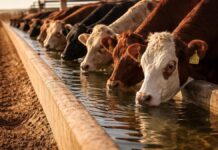Jacques Taylor, Managing Director for Sub-Saharan Africa at John Deere
With 90% of sub-Saharan Africa’s food currently produced by smallholder farmers on plots typically under two hectares, the continent’s traditional farmers are a vital element of food security. Since the continent also has over 60% of the worlds potential arable land, how Africa’s farmers are supported to mechanise and industrialise is not only critical to the future of Africa, but also the entire world.
“Agricultural development through the broader inclusion of marginalised agricultural communities into global supply chains, however, requires access to capital and markets,” observes Jacques Taylor, Managing Director for Sub-Saharan Africa at John Deere. Today, rapid advances in agricultural technology hold the potential to increase the yield and quality of the continent’s smallholder farmers’ produce. Importantly, these technologies have the potential to make Africa’s previously marginalised farmers, “relevant to global investment and supply chains – without interrupting Africa’s existing smallholder rural landscape,” says Taylor.
Fortunately, most of the building blocks – and many practical examples – of how to achieve this already exist in Africa.
Leveraging commercial supply chains
East African Breweries recently contracted its hops supply to approximately 100 smallholder farmers, deploying its procurement program to transform local farmers into successful commercial hops suppliers.
Technology unlocking commercial potential
In Kenya, for example, Diagio works directly with farmers and farmer groups, promoting the sustainable supply of drought-resistant sorghum to local commercial and industrial supply chains. This successful market-driven initiative has not only improved farming techniques and livelihoods but has also transformed local and regional economies – substantially increasing yield and attracting investment.
Accessing markets through collaboration and scale
John Deere’s own experience in successful transformation began by supporting four emerging grain farmers in Taung in the North West province of South Africa by placing 80 hectares of their government-granted land under irrigation. Working with Anglo American who co-opted retired commercial farmers as advisors on the project, John Deere provided two combine harvesters. John Deere also structured a grant of, originally, R100 000 through John Deere Financial. The program was supported, on the ground, by the local John Deere dealership and additional collaborators. SENWES assisted with silo and storage infrastructure while Farmwize came on board with marketing and sales.
“Today, just three years later, the project covers 700 hectares and includes 57 smallholder farmers, all producing profitably for the commercial market,” says Taylor.
The Taung transformation project demonstrates that, “genuinely empowering smallholder farmers in South Africa requires the private sector and the broad agricultural value chain to come together to make transformation commercially sustainable and permanently inclusive,” says Taylor.
Monetising traditional farming ecosystems
Nestlé works with 716 000 farmers around the world, supporting the development of market-driven sustainable supply chains through an assessment program that improves the profitability of farmers and rural communities.
Market-aligned policy
The importance of investing in individual farmers, equipping them to access capital and supply markets, has also been recognised – and prioritised – by the United Nations. The United Nation’s International Fund for Agricultural Development (Ifad), for example, recently announced that it would be shifting funding from governments to smallholder farmers in developing countries. Despite producing half the world’s calories, most smallholder farmers can’t access loans. By re-focussing funding on small agricultural businesses that supply local markets in developing countries, Ifad expects to include many of the world’s smallholder farmers in economically sustainable commercial agricultural value chains.
The world over, governments are working to understand and enable the full potential of their agricultural value chains, “especially the complex relationships between agriculture, growth, employment, global trade, food security, social cohesion – and even international influence and power,” says Taylor.
As a leading global technology company focused on agriculture, John Deere leads innovation in the technologies, data, investment and policies required to industrialise and globalise agriculture in Africa. With this insight, “John Deere is enabling the green revolution that will see Africa assume its rightful place as a global agricultural giant,” concludes Taylor.








